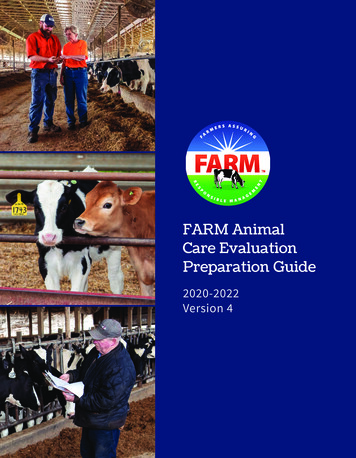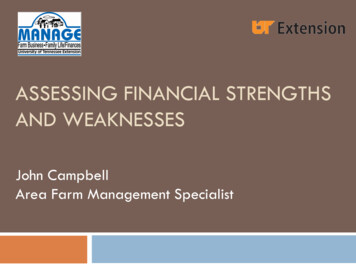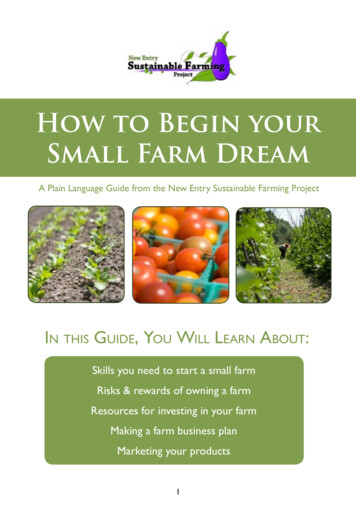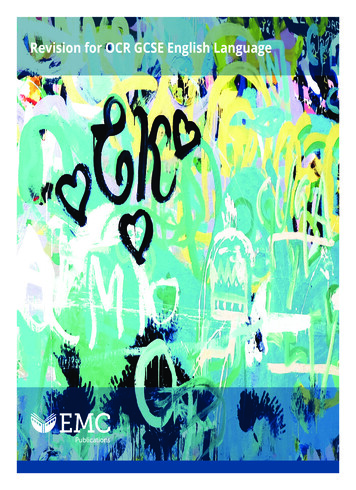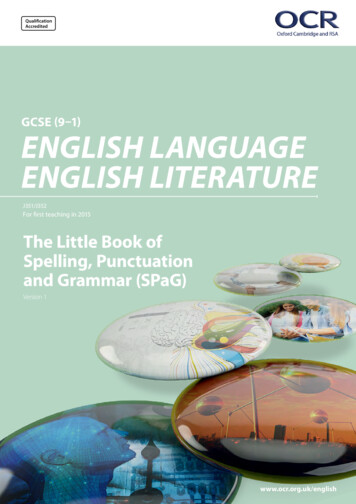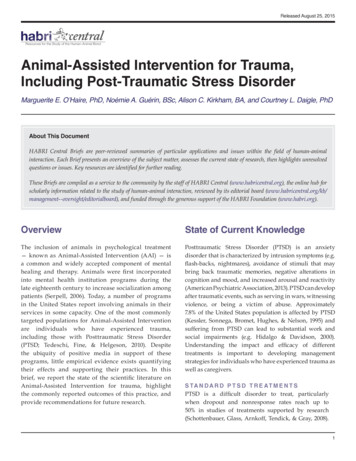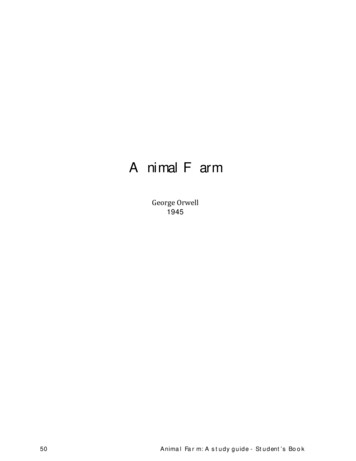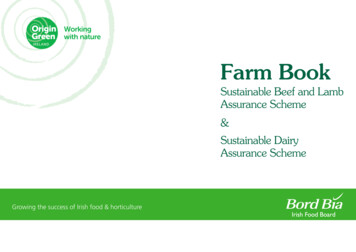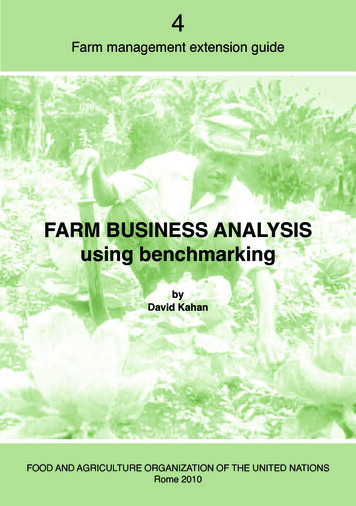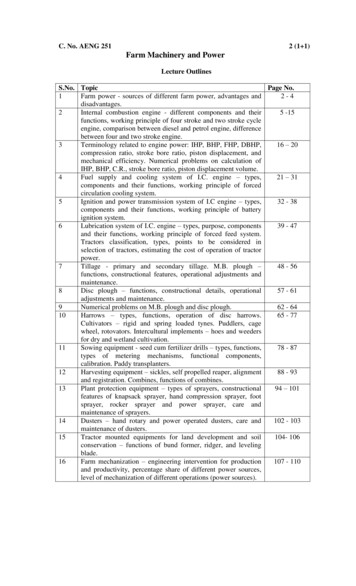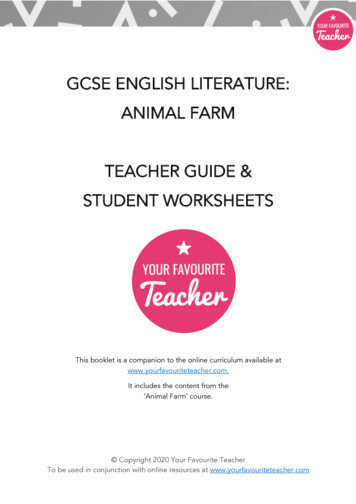
Transcription
GCSE ENGLISH LITERATURE:ANIMAL FARMTEACHER GUIDE &STUDENT WORKSHEETSThis booklet is a companion to the online curriculum available atwww.yourfavouriteteacher.com.It includes the content from the‘Animal Farm’ course. Copyright 2020 Your Favourite TeacherTo be used in conjunction with online resources at www.yourfavouriteteacher.com
Modern Text: Animal Farm, by George OrwellThis pack covers context, plot outline, character and theme analysis, together with someexam style questions and answers.This booklet contains: Suggested teaching orderLearning objectives for each sessionQuestions or activities that teachers could use in their lessonsA worksheet for each sessionExam style questionsSuggested Teaching Order and Learning ObjectivesLesson1FocusPlot Overview &Context2Napoleon3Snowball4Squealer5Minor Characters6Theme: Animalism7Theme: Education8Theme: PowerLearning ObjectivesTo consolidate understanding of the plot and detailkey events.To be able to show an understanding of therelationships between the text and the context inwhich it was writtenTo be able to identify key characteristics and analysequotes linked to the character.To be able to develop an informed response toSnowball and make connections between thischaracter and key themes.To be able to analyse the language used by Squealerin the novel.To be able to identify key events that link Squealer topower and education.To be able to identify the key events linked to minorcharacters and analyse how they link to the maincharacters.To be able to use textual references to show anunderstanding of the theme and developinterpretations.To be able to be able to link key events from thistheme to the historical context in which the text waswritten.To be able to highlight the key characters linked tothis theme and analyse relevant textual detail to forma strong interpretation. Copyright 2020 Your Favourite TeacherTo be used in conjunction with online resources at www.yourfavouriteteacher.com
Suggested Questions for Discussion and/or ActivitiesLesson Focus1Plot Overview& 6Animalism7Education8PowerQuestions/ Activities Create a summary of what happens in the novel The novel follows a cyclical structure. What does this mean andhow is it shown in the novel? To what extent does Orwell show a true depiction of the RussianRevolution? Create a list of adjectives to describe Napoleon. Select three quotes about Napoleon and annotate them, analysinguse of language, form and structure. To what extent can Napoleon be seen as a good leader? Usequotes/events from the novel to back up what you are saying.Write as an analytical paragraph (PEE/PETAL/PETER etc) Who from the Russian Revolution does Snowball represent? What are the key differences between Napoleon and Snowball? How does Orwell characterise Snowball in the novel? Use quotesto back up your interpretations. What contextual information can you link to Snowball? Give examples of how Squealer manipulates language to oppressthe other animals on the farm. Analyse the use of language, formand structure. Who from the Russian Revolution does Squealer represent? How does Orwell characterise Squealer in the novel? Use quotes toback up your interpretations. Create a list of minor characters in the novel (these should be characters who make a significant impact to the storyline, but don’t appear regularly in the novel) How do the minor characters help in driving the plot forward? Why is Old Major an important minor character? What theme(s) does Mr Jones represent and why? List three characters that link to this theme. List three key events that link to this theme. What contextual information can you link to this theme? Which characters represent this theme? What are the main events in the novel which link to this theme? List and annotate three quotes you could use if responding to thistheme in the exam List three characters that link to this theme. List three key events that link to this theme. What contextual information can you link to this theme? Copyright 2020 Your Favourite TeacherTo be used in conjunction with online resources at www.yourfavouriteteacher.com
Lesson 1: Plot Overview & ContextSection A of the literature paper two exam requires you to respond to one of twoquestions (your choice), but you won’t have the text in front of you. For moststudents, this is daunting, so to start with you just need a firm understanding of theplot. You’ve read the book in your lessons (and hopefully once at home as well!) Youwill have watched the film adaptations too, so just one more time, have a read ofthe plot overview below. The more you remember of the whole plot, the more likelyyou’ll have a clear response that covers multiple key events from the story!Animal Farm: PlotThe book opens with a clear view of life onManor Farm. The animals are unhappy andfeel oppressed under Mr Jones’ rule. OldMajor, the farm’s prize boar, leads a meetingabout how the effort of the animals on thefarm benefits man and not them. The animalslearn that a revolution is coming to overthrowMr Jones, so that the animals can all live abetter life free from oppression.Old Major soon dies of old age and the pigspersuade the rest of the animals to join themin taking over the farm. They are successful inthis and run the humans out of the farm. Thepigs learn how to read and write, thereforetake charge in leading the other animals instarting their new life on Animal Farm. Theyconsolidate Animalism (what Old Major talkedabout in his meeting) into sevencommandments for all to live by:1. Whatever goes upon two legs is an enemy2. Whatever goes upon four legs, or haswings, is a friend Copyright 2020 Your Favourite TeacherTo be used in conjunction with online resources at www.yourfavouriteteacher.com
3. No animal shall wear clothes4. No animal shall sleep in a bed5. No animal shall drink alcohol6.7.No animal shall kill any other animalAll animals are equalThe animals all work together to complete theharvest, with Boxer the horse working the hardestof all. The pigs arrange weekly meetings and welearn that Napoleon and Snowball are the mainleaders who can’t agree on anything. Snowballinvests his time in helping the other animals learnto read and write, whereas Napoleon just wants tobenefit himself. Small things start to happen thatgo against Animalism, like the pigs having the milkand apples and the puppies being taken away byNapoleon to be privately educated.The humans soon return to try and take back thefarm, for fear of the revolution spreading to theneighbouring farms. The animals are successfulonce again, although a few are hurt in the process.The animals make badges of honour to show theirbravery.Snowball puts forward the idea of building awindmill to help speed up the harvest. Napoleonis against the idea and urinates all over theplans. At this point, it becomes clear that the twodon’t get on and are fighting for leadership overthe farm, going against the final commandment. Napoleon calls the puppies thathe’d taken to privately educate, but now they are fully grown and vicious. Theychase Snowball from the farm and Napoleon takes charge. The animals then moveforward with building the windmill after Squealer convinces them that Snowballstole the plans from Napoleon.The pigs move into the farmhouse and sleep in the beds. It’s at this point that theother animals realise that commandments are being broken, but they start tomysteriously change to benefit the pigs. A violent storm destroys the windmill andall the animals’ hard work, but Napoleon convinces them that it was Snowball’sdoing. They start from scratch building the windmill. Copyright 2020 Your Favourite TeacherTo be used in conjunction with online resources at www.yourfavouriteteacher.com
During a food shortage, the pigs open uptrading with the humans from other farms.The hens refuse to give up their eggs fortrade, so Napoleon stops their foodallowance until they give in. Any animalthought to be in league with Snowball isslaughtered, again going against thecommandments. When the animals questionthis, they are shown the commandmentswith added comments and convinced bySquealer that they remembered wrong.The windmill is built and named NapoleonMill, despite all of Boxer’s hard work. The other farmers use dynamite to destroy thewindmill due to a dispute about trade between the farms. Work begins to rebuildthe windmill for a third time, with Boxer intent on completing it before he retires.Boxer ends up collapsing due to working too hard,but instead of sending him to a vet, the pigs sellhim to the glue factory, profiting from his slaughter.The other animals believe he’s gone to be lookedafter and Benjamin, the only other animal on thefarm who can read, realises too late so they can’tsave him.The final chapter is set years later, with very fewanimals still alive who remember the events fromchapters 1-9. The pigs are still above the otheranimals, now walking on two legs, wearing clothesand treating the others poorly, just like Mr Jones atthe start of the book. The book ends as it begins,with the animals deeply oppressed, whilst the pigs benefit from their weakness. Copyright 2020 Your Favourite TeacherTo be used in conjunction with online resources at www.yourfavouriteteacher.com
CONTEXTGet ready for a mini history lesson! Animal Farm was heavily influenced by the Russian Revolution, and a lot of the characters represent prominent people connectedto the revolution at the time. Although it means a bit of extra revision, this is greatfor you as it means you’ll be able to gain up to sixextra marks easily! This is dependent on how detailed your contextual links are, so make notes onthe following information and be sure to go backover it before the exam.Who is George Orwell and why did he write AnimalFarm?George Orwell (1903-1950) is a well known Britishwriter, famous for his novella ‘Animal Farm’ as wellas many other novels such as ‘1984’. Orwell was veryaware of social injustice and was outspoken in hissupport of democratic socialism. ‘Animal Farm’ is an allegory, meaning it was written to reveal a hidden political meaning. In this case, Orwell was warning his readersof the consequences of Stalinism and the Totalitarian government.How is the Russian Revolution connected to Animal Farm?Before 1917, Tsar Nicolas II ruled Russia. The upperclass were rich and powerful, whilst the majority of thepopulation were poor and lived in appalling conditions. They received low wages and and little food.This is similar to Mr Jones at the start of the novel,with his poor leadership on the farm leading to the animals living in squalor and being malnourished. Copyright 2020 Your Favourite TeacherTo be used in conjunction with online resources at www.yourfavouriteteacher.com
Nicolas was eventually overthrown as the people organised a rebellion to knock himout of power. This rebellion was led by Lenin and supported by Stalin and Trotsky.Lenin soon died and the struggle for leadership intensified between Stalin and Trotsky. Sound familiar? Old Major represents Lenin, with Stalin and Trotsky representedby Napoleon and Snowball.Trotsky wanted to educate his people, whereas Stalinestablished control of the secret police. In 1918, therewas a civil war in Russia. Western countries sent armies to fight as they were worried that Communism(the idea that everyone is equal) might spread. Youguessed it – this is the part in the novel where MrJones and the neighbouring farmers try to win back thefarm. Communism is Animalism, which Old Major talksabout at the start of the novel.Stalin began to dictate and command people, going against the concept of Communism. Meanwhile, Trotsky was trying to industrialise Russia, but was discreditedby Stalin. Eventually, Stalin forced Trotsky out of Russia by using the secret policeand propaganda. Remember the part of the novel where Snowball reveals the plansfor the windmill? That would be the industrialisation of Russia. Then, Napoleon urinates all over the plans (discrediting him) and soon after calls the nine dogs (secretpolice) to expel Snowball from the farm.Stalin continued to dictate and command, industrialising Russia anyway and wanting to be worshipped almost as a God-like figure. The peopleof Russia suffered greatly during this time and Stalin ended up more like Tsar Nicolas II, than a manwho wanted a new society based on Marx andCommunism. We don’t need to spell it out for youto connect the dots, this period of history is identical to what you read in the novel. It starts whereit began, under cruel and oppressive leadership,with the upper classes benefiting and the lowerclasses barely surviving. Copyright 2020 Your Favourite TeacherTo be used in conjunction with online resources at www.yourfavouriteteacher.com
Animal Farm: Plot WorksheetBriefly explain the key events of each chapter.Chapter 1Chapter 3Chapter 2Chapter 4Chapter 5 Copyright 2020 Your Favourite TeacherTo be used in conjunction with online resources at www.yourfavouriteteacher.com
Chapter 6Chapter 9Chapter 7Chapter 8Chapter 10 Copyright 2020 Your Favourite TeacherTo be used in conjunction with online resources at www.yourfavouriteteacher.com
Animal Farm: Context WorksheetAnswer the following questions, to further your understanding of the novel’s context1. What contextual links can you provide for the plot? . . . . . . . . . . . . . . . . . . . . . . . . . . . . . . . . . . . . . . . . . . . .2. What contextual links can you provide for Mr Jones? . . . . . . . . . . . . Copyright 2020 Your Favourite TeacherTo be used in conjunction with online resources at www.yourfavouriteteacher.com
. . . . . . . . . . . . . . . . . . . . . . . . . . . . . . . .3. What contextual links can you provide for Old Major? . . . . . . . . . . . . . . . . . . . . . . . . . . . . . . . . . . . . . . . . Copyright 2020 Your Favourite TeacherTo be used in conjunction with online resources at www.yourfavouriteteacher.com
4. What contextual links can you provide for Napoleon? . . . . . . . . . . . . . . . . . . . . . . . . . . . . . . . . . . . . . . . . . . . .About the AuthorWhat kind of upbringing did George Orwell have? . . . . . . . . . . . . . . . . . . . . . . Copyright 2020 Your Favourite TeacherTo be used in conjunction with online resources at www.yourfavouriteteacher.com
What ideas influenced his writing? . . . . . . . . . . . . . . . . . . . . . .What message does he convey in Animal Farm? . . . . . . . . . . . . . . . . . . . . . . Copyright 2020 Your Favourite TeacherTo be used in conjunction with online resources at www.yourfavouriteteacher.com
Lesson 2: NapoleonFor this section of the exam, you won’t have the book in front of you. Therefore, it’s reallyimportant to know key quotes for all characters/themes that may come up. Here are a fewfor Napoleon, alongside possible interpretations, to get you started.‘The only Berkshire on the farm’ (chapter 1)Possible Interpretation: Napoleon is referred to as ‘the only Berkshire’, which suggests he isabove the rest of the animals, as he is the only one. This also reinforces the idea thatNapoleon thinks highly of himself, that he is special and unique. From the beginning, thereader gets the impression that Napoleon is self-centred in nature and is superiorcompared to the others.‘Reputation for getting his own way’ (chapter 1)Possible Interpretation: The noun ‘reputation’ immediately signifies that Napoleon is wellknown amongst the other animals, before any rebellion takes place. This hints thatNapoleon isn’t a nice character, strengthened by the phrase ‘getting his own way’. Thesewords imply that Napoleon is persuasive and intimidating, again signalling that he isn’tliked by others.‘As soon as they were weaned, Napoleon took them away from their mothers’ (Chapter 3)Possible Interpretation: This shows the cunning side to Napoleon. He uses the dogs for hisown personal gain (they come back as fierce hounds in a later chapter) and uses them as aweapon against the other animals. The phrase ‘as soon as they were weaned’ suggests thatNapoleon was able to easily manipulate them as they were so young. This reinforces hisnasty character, as he shows no remorse in taking them ‘away from their mothers’,highlighting how young the puppies were when they were taken. This quote is followed by‘the rest of the farm soon forgot their existence’, showing Napoleon’s persuasive nature.This could also highlight an insecurity in Napoleon, as he feels he needs the dogs to helpspark fear in the other animals. Copyright 2020 Your Favourite TeacherTo be used in conjunction with online resources at www.yourfavouriteteacher.com
‘He lifted his leg, urinated over the plans and walked out without saying a word’ (Chapter 5)Possible Interpretation: This quote highlights Napoleon’s jealousy towards Snowball, whospent a great deal of time on the plans for the windmill. The fact that Napoleon isn’t asintelligent to have thought about it, shows his deep hatred for Snowball. The fact that he‘walked out without saying a word’ highlights his lack of developed language compared toSnowball. He doesn’t know what to say, so resorts to ‘urinating over the plans’, emphasisinghow childish and immature he is. This acts as a red flag for the reader, as we immediatelydon’t trust Napoleon to be a fair and honest leader on the farm.‘There was a pile of corpses lying before Napoleon’s feet’ (Chapter 7)Possible Interpretation: At this point in the novel, Napoleon has convinced the animals toconfess to a crime in which they did not commit, resulting in their death. Therefore, thisquote characterises Napoleon as a tyrant. He has gone against arguably one of the mostimportant commandments: ‘no animal shall kill any other animal’. The ‘corpses lying beforeNapoleon’s feet’ create a vivid image in the reader’s mind as Napoleon being a characterto be feared. It places him above the rest of the animals, characterising him as nasty,manipulative and intimidating. This is reinforced by Orwell’s use of sibilance to describe thescene. Copyright 2020 Your Favourite TeacherTo be used in conjunction with online resources at www.yourfavouriteteacher.com
Practice QuestionsHow does Orwell use the character of Napoleon to explore ideas about leadershipin Animal Farm?Write about: How Orwell presents NapoleonWhat Napoleon says and does in the novel‘Napoleon was now never spoken of simply as “Napoleon.” He was always referred to informal style as “our Leader, Comrade Napoleon,”‘To what extent can Napoleon be seen as a cruel and oppressive leader?Write about: How Napoleon’s character changes and develops as the novel progressesHow Orwell presents Napoleon Copyright 2020 Your Favourite TeacherTo be used in conjunction with online resources at www.yourfavouriteteacher.com
Napoleon WorksheetCharacter DescriptionKey ThemesKey RelationshipsKey Quotes Copyright 2020 Your Favourite TeacherTo be used in conjunction with online resources at www.yourfavouriteteacher.com
Lesson 3: SnowballFor this section of the exam, you won’t have the book in front of you. Therefore, it’s reallyimportant to know key quotes for all characters/themes that may come up. Here are a fewfor Snowball, alongside possible interpretations, to get you started.‘Quicker in speech and more inventive’ (chapter 1)Possible Interpretation: This quote is a clear indicator of the difference between Snowballand Napoleon. ‘Quicker in speech’ suggests Snowball is very clever and understandslanguage a lot better than the other pigs, therefore he would be the best animal to lead thefarm. The fact that he’s ‘more inventive’ implies he is very creative, which can be seen whenhe reveals the complicated plans for the windmill later in the story. These traits characteriseSnowball as intelligent and kind, traits which make him likeable and traits that Napoleon isjealous of.‘Snowball read it aloud for the benefit of the others’ (chapter 2)Possible Interpretation: These words show how kind Snowball is towards the other animalson the farm. The majority of his decisions in the story are ‘for the benefit of the others’. Thismakes him a likeable character for the readers. He’s a positive influence on the farm andgenuinely cares.‘Get in the harvest more quickly than Jones and his men could do’ (Chapter 2)Possible Interpretation: The adverb ‘quickly’ suggests that Snowball wants to show theneighbouring farms that they can do a good job on their own, without Mr Jones. Again thisreinforces the idea that Snowball’s decisions are to benefit all the animals, not just himself.The decision to take over the farm puts the animals in a good position, which is shownthrough Snowball’s determination to get the harvest in. Copyright 2020 Your Favourite TeacherTo be used in conjunction with online resources at www.yourfavouriteteacher.com
‘Snowball now gave the signal for charge. He himself dashed straight for Jones’ (Chapter 4)Possible Interpretation: The phrase ‘gave the signal for charge’ suggests that Snowball wasthe leader of the battle of the cowshed. It shows his good leadership skills and ability toorganise the other animals. The phrase ‘he himself dashed straight for Jones’ depicts him asselfless and courageous during battle. The verb ‘dashed’ connotes quickness and strength.Going straight for Jones, knowing he had a loaded gun shows how brave he was, wantingto encourage the other animals that they can be brave too. Again this highlights a keydifference between him and Napoleon.‘Snowball often won over the majority with his brilliant speeches’ (Chapter 5)Possible Interpretation: The fact that Snowball ‘often won over the majority’ highlights howliked he is amongst the other animals on the farm. It also shows that they trust him to makethe right decisions and to help and support everyone, rather than just doing things tobenefit himself (like Napoleon). The adjective ‘brilliant’ suggests that Snowball was giftedand creative in his speech, which would have been reassuring to the other animals, againreinforces the idea that he is a trustworthy character. Copyright 2020 Your Favourite TeacherTo be used in conjunction with online resources at www.yourfavouriteteacher.com
Practice QuestionsHow does Orwell use the character of Snowball to explore ideas about leadership andeducation in Animal Farm?Write about: How Orwell presents Snowball in relation to leadership and/or educationWhat Snowball says and does in the novelExplore how Orwell characterises Snowball in Animal Farm.Write about: How Orwell characterises Snowball in the novelHow Snowball interacts with the other animals on the farm Copyright 2020 Your Favourite TeacherTo be used in conjunction with online resources at www.yourfavouriteteacher.com
Snowball WorksheetCharacter DescriptionKey ThemesKey RelationshipsKey Quotes Copyright 2020 Your Favourite TeacherTo be used in conjunction with online resources at www.yourfavouriteteacher.com
Lesson 4: SquealerFor this section of the exam, you won’t have the book in front of you. Therefore, it’sreally important to know key quotes for all characters/themes that may come up.Here are a few for Squealer, alongside possible interpretations, to get you started.‘Very round cheeks, twinkling eyes, nimble movements, and a shrill voice’ (chapter1)Possible Interpretation: Orwell’s words characterise Squealer as sly and sneaky,through the adjectives ‘twinkling’ and ‘nimble’. These both connote cunning anddeviousness, depicting Squealer as dishonest. The phrase ‘shrill voice’ reinforcesSquealer’s role as one to spread propaganda to make Napoleon seem morepowerful. It also displays a clear link to the propaganda used in the RussianRevolution (Pravda).‘The others said of Squealer that he could turn black into white’ (chapter 1)Possible Interpretation: This quote show the reader how persuasive and convincingSquealer can be. As this is one of the initial descriptions of Squealer, it acts as a redflag and makes the reader aware that he is a character not to be trusted. This isshown countless times throughout the story as Napoleon uses Squealer to scare theother animals into submission.‘Surely, Comrades surely there is no one among you who wants to see Jonescome back?’ (Chapter 3)Possible Interpretation: The repetition of the adverb ‘surely’ displays Squealer’spersuasive nature. The rhetorical question acts as a threat to the other animals withJones coming back to make sure nobody tries to overthrow Napoleon. Using thenoun ‘comrades’ creates a false sense of security for the animals; it makes them feelincluded and part of the team, but the underlying sibilance in the whole quotereinforces Squealer’s sly and manipulative nature. Copyright 2020 Your Favourite TeacherTo be used in conjunction with online resources at www.yourfavouriteteacher.com
‘I trust that every animal here appreciates the sacrifice that Comrade Napoleon hasmade’ (Chapter 5)Possible Interpretation: Like the use of ‘comrades’ in the previous quote, the noun‘trust’ creates a sense of togetherness. This would make the animals feel guilty forthinking badly of Napoleon. Also, the verb ‘sacrifice’ creates a religious tone,aligning Napoleon with being a God-like figure sacrificing himself to help others,which again would make the animals feel guilty. This again shows the power ofSquealer’s persuasive nature, as he manipulates the farm animals into thinking thatNapoleon’s decisions are for the greater good.‘Do you not remember Snowball suddenly turned and fled , and many animalsfollowed him?’ (Chapter 7)Possible Interpretation: The phrase ‘do you not remember’ suggests Squealer ismanipulating the other animals’ memories, which is easily done as most wer
Animal Farm: Plot The book opens with a clear view of life on Manor Farm. The animals are unhappy and feel oppressed under Mr Jones’ rule. Old Major, the farm’s prize boar, leads a meeting about how the effort of the animals on the farm benefits man and not them. T
